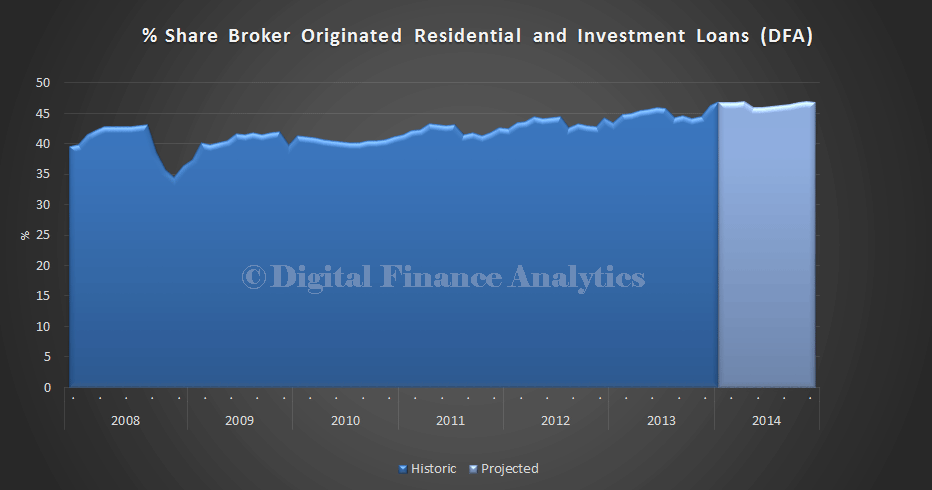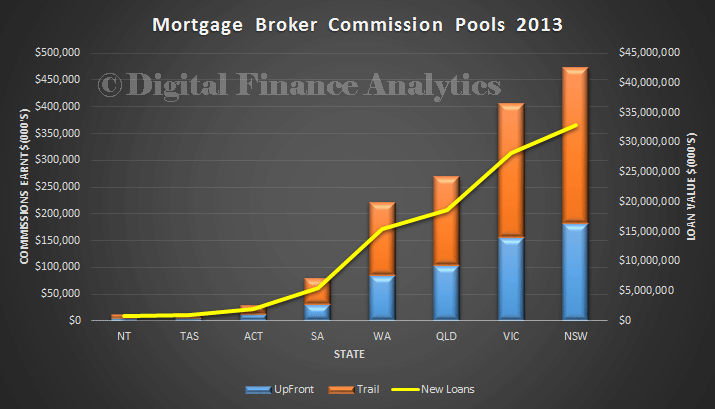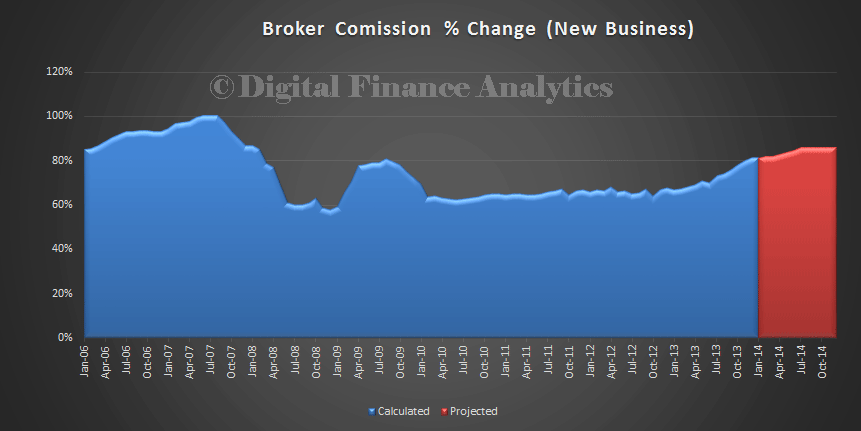http://www.digitalfinanceanalytics.com/blog/mortgage-brokers-day-in-the-sun/
We just updated our mortgage broker models, to take into account recent transaction patterns and commission changes. Our last snapshot was in November last year. Brokers are doing very well at the moment, thanks to increases in the average mortgage transaction value, lifting volumes, and more generous commission rates from the banks who are actively competing for business in the low interest rate environment. In addition, more households are turning to mortgage brokers for assistance, especially those seeking deals for investment loans. You can see our research on household attitudes to brokers here.
The overall share of new loans via the broker channel is up, reaching 46% of loan applications. We expect volumes to continue to grow.
Mortgage broker commissions took a hit following the GFC, with volumes down, and commission rates cut. But through 2013, we saw some upward tweaks to mortgage broker commissions.
Most mortgage brokers are aligned with one of the 50 or more aggregators, who provide services for the brokers, marketing support, and negotiates bi-lateral commissions with individual banks. The MFAA maintains a list of aggregators here. Commission structures vary between lenders and broker groups, and individual rates are not always easy to find. Some aggregators, like Mortgage Choice maintain a fixed commission payment to brokers, irrespective of deals with the banks, others pass-through commissions to brokers as they change, perhaps retaining a cut. In addition to hard commissions, aggregators may negotiate tiered structures based on specific volumes or product types, and may receive special deals from individual lenders at different times as well as soft benefits including bank sponsorship of conferences, holidays for top brokers, and other benefits. Most brokers will choose to align with a single aggregator, although some maintain multiple relationships for different types of loans. A small number of aggregators rebate some commission back to borrowers, but this is relatively unusual. The number of lenders on individual aggregator panels varies.
In July 2013, Bankwest increased its upfront commissions from 50 basis points to 70, whilst scrapping its trailing commission for the first year of 15 basis points. This was in response to Westpac offering to pay 10 basis points extra to September in an attempt to stimulate broker led deals, offering 60 basis points upfront. Others followed, with St George, AMP and Rock Building Society lifting rates of commission. Macquarie Group in November raised its up-front and trailing commissions for business written via Mortgage Choice, one of the biggest aggregator groups.
In 2013, mortgage brokers pocketed commissions of about $1.5bn, including both upfront and trails.
Factoring in the recent changes, we see that commissions received by brokers overall are up. We baseline our model to the previous commission peak in 2007, before the GFC, and we see that commissions are now back over 80% of the previous high levels. We expect commissions to continue to grow.
How do changes in commissions impact the dynamics of the market? Commissions must be disclosed to prospective borrowers, and the loan must not be unsuitable – a weaker level of protection than being the “best” loan. It is clear though that the industry believes they can get competitive advantage from tweaking broker commissions, and our research confirms that brokers will consider the commissions they receive, along side factors like speed of decision and broker service when selecting a lender from their panel.
Commissions are paid to brokers by the lender, based on the value of the transaction, so it could be argued there is no cost to potential borrowers. Actually, many lenders incur more costs originating a loan via their branch network than via a broker. The truth is, origination and commission costs are all scrambled in the banks books, and the costs have to be recovered somewhere, so it will flow into overall margins and fees. Whether a prospective purchaser gets a better deal via a mortgage broker compared with negotiating direct with a bank is a moot point. Brokers with a good panel of lenders may be able to find a better deal. That said, brokers often do the heavy lifting when it comes to managing and tracking a loan application and many customer think this is worthwhile.
At the moment, brokers are enjoying their day in the sun as momentum in the mortgage market continues to build.
The next big thing will be the continued rise of direct digital channels which has the potential to disrupt the mortgage broking model. Digital Natives expect to use their mobile devices instead of face2face interactions, and as yet brokers are yet to rise to the challenge of the digital revolution. We discussed this yesterday.
{rokcomments}




Recent Comments